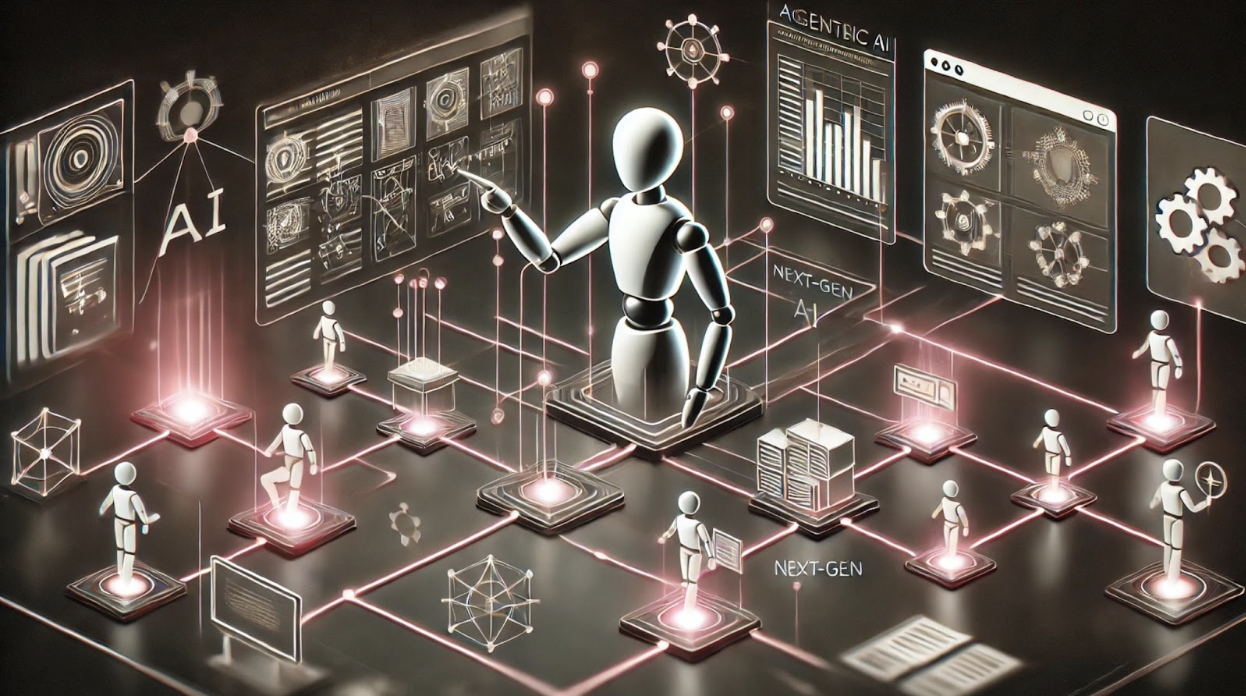What is Agentic AI? Is It the Next Big Thing?

In the 2024 McKinsey Global Survey on generative AI, 65% of respondents reported that their organizations regularly use GenAI. The adoption has nearly doubled in less than a year. You’re most likely using generative AI personally or in your company for everything from straightforward tasks like getting help writing a blog post to more complex work analyzing finance data. While generative AI is great at creating new content or providing analysis based on your input or prompts, it’s still limited. It requires constant input from you. But – what if the results and outputs could be achieved automatically, without any prompts at all?
That, basically, is what Agentic AI does.
In this article, we’ll discuss Agentic AI workflows, how they work, and how you can start implementing them.
What is Agentic AI?
Agentic AI refers to autonomous AI systems (aka AI agents) that can work, decide, plan, and act independently to achieve complex goals without human intervention. They can also self-optimize by learning from and adapting to their environment.
The most popular example of this concept is a self-driving car. It uses advanced AI technology to sense what's happening around it (such as activity from cars, pedestrians, or traffic signals) and make decisions in real time. These decisions include when to stop, turn, or change lanes.
This process allows self-driving cars to achieve their ultimate goal: transporting passengers to their destinations with little-to-no input from the driver.
What are AI Agentic Workflows?
Agentic AI workflows are processes infused with the autonomous capabilities of different AI agents. A "process" can be any task or goal as long as it can be divided into multiple steps.
An AI Agent can then:
- Break down the main task into smaller, more manageable sub-tasks
- Establish the optimal sequence of that workflow
- Execute that workflow independently
- Self-evaluate its own output and refine the workflow accordingly
- Continuously adjust its performance as new data becomes available.
Once the workflow is built, humans may provide little to no input. However, workflows can also be constantly updated to ensure efficiency and security.
Let's examine potential applications of Agentic AI to better understand how they might work for your organization.
Healthcare Agentic AI
AI Agents can offer valuable support during the diagnostic process, which is often one of the biggest challenges in healthcare. In fact, diagnostic errors affect an estimated 12 million Americans each year.
An AI Agent can help analyze terabytes of medical data in seconds. It can spot red flags and compare them to the latest research, giving doctors valuable personalized data. With an AI Agent on the case, physicians can diagnose patients faster and with laser-like precision.
Finance AI Agents
AI trading systems are widely used today but still face significant challenges due to their reliance on algorithms primarily trained on historical data. While these systems excel at making decisions based on past trends, they often struggle to adapt quickly to new market information or unpredictable events. Even with advancements like RAG (Retrieval-Augmented Generation), which can incorporate real-time data, AI systems can still face difficulties when unexpected factors or rapid market changes arise. These limitations are particularly evident during volatile conditions, where the systems may require human intervention to adjust strategies, ensuring that decisions align with the market's fluid dynamics.
In contrast, investment AI Agents, which continuously analyze real-time financial reports and track global economic trends, are better equipped to respond to fast-changing market conditions. These agents can execute split-second trades, maximizing profits while minimizing risks. Their ability to operate autonomously 24/7 ensures constant market monitoring and immediate action when opportunities or risks present themselves. Although AI Agents do not guarantee profits, their capacity to process large volumes of real-time data and make rapid, informed decisions offer a significant advantage in optimizing trading performance.
Agentic AI in Supply Chain Management
Supply chain management is another area where Agentic AI can make a significant impact. It’s a field in which many different players–suppliers, manufacturers, distributors, and retailers—are involved, and trying to coordinate everything from managing inventory to forecasting demand to sorting out transportation logistics can be a real headache.
In the United States alone, the average annual cost of inefficient supply management is estimated to be 228 million U.S. dollars per year.
That’s why Agentic AI can be a smart solution. Heads of Operation can train agents to continuously monitor inventory levels across multiple warehouses. When they detect a potential shortage, they can automatically place orders with suppliers so the right products are always in stock.
These AI agents can also optimize real-time delivery routes, considering traffic, weather, and vehicle capacity.
Agentic AI in Human Resources (HR)
Even HR departments can benefit from automating complex workflows with AI agents. Recruiting new employees is a process that takes tons of time and resources. You have to review hundreds of resumes, decide how to hire, and conduct countless interviews. With Agentic AI workflows, this process can be automated by:
- Screening and shortlisting resumes based on predefined criteria.
- Analyzing candidate data to identify top talent and predict candidate success within the organization.
- Streamlining the onboarding process by automating paperwork, training schedules, and initial orientation tasks.
The HR possibilities with Agentic AI are endless, and they will depend on your business goals, industry, and security and compliance requirements.
Gen AI vs. Agentic AI
Now that we've explored the concept of agentic AI and its potential applications let's compare it to generative AI to flesh out the differences and capabilities of these two AI technologies. Understanding the differences will help you make better decisions about when to use them.
Now that we’ve looked at the differences, can you answer this question: which process(es) in your company can be replaced with AI agents?
Depending on your industry, you may also need to consider other logistical and legal factors. Hopefully, knowing these differences will give you more insights and inspiration to drive you in the right direction.
Agentic AI: Pros and Cons
While agentic AI is in many ways the hot new trend in AI, it does have its pros and cons.
Pro: Autonomy and Efficiency
The defining feature of agentic AI is autonomy. Unlike generative AI, where the output depends on the effectiveness of your input, agentic AI is already programmed to run the most efficient workflow to achieve a specific task. For example, for HR, you don’t have to upload resumes and prompt ChatGPT to search for specific criteria. Instead, you are presented with the best resumes based on the pre-built AI workflows.
Pro: Improved Productivity
By taking over routine tasks, agentic AI frees your employees to engage in more meaningful, creative work. According to some estimates, companies using AI assistance have seen employee productivity increase by up to 14%. Imagine if the majority of routine tasks were to be automated… It could revolutionize how we think about and approach work.
Pro: Intelligent Decision-Making
Intelligent agents blend human-level problem-solving skills with the capabilities of a pre-trained model and they also learn from new feedback. This adaptability allows businesses to respond more effectively to dynamic market conditions, customer behaviors, and operational challenges.
Pro: Scalability and Integration
Designed well, AI agents can easily integrate your existing business workflows across multiple platforms, making them enormously scalable. So, whether you want to expand your operations or enter new markets, agentic AI can grow with you–handling increased workloads without significantly more resources.
Pro: Energy Efficiency
Agentic AI systems are typically smaller and more energy-efficient than large language models. They require less scalable computing power to train complex models, which cuts costs and can help organizations maintain eco-friendly practices.
Con: Lack of Transparency
A major downside of agentic AI systems is that they can be like black boxes. It's often hard to see how they make decisions, which can be unsettling and make it tough to audit their actions.
Con: Risk of Unintended Consequences
Since agentic AI operates independently, there's a risk it might make decisions that lead to unexpected problems–especially in situations it wasn’t specifically programmed for.
Con: Security and Privacy Concerns
These systems often handle sensitive data, raising concerns about security breaches and privacy issues. Keeping them secure can be a big challenge for organizations, especially in industries like health and finance. For instance, Arcee’s Enterprise solution can deploy the entire system in your virtual private cloud without security concerns.
Con: Complex Setup
Agentic AI systems are immensely sophisticated. Building and managing them can be equally complex and require significant investment from businesses.
However, some agentic AI solutions can be energy-efficient and cost-efficient, especially when they are based on pre-trained small language models. For example, Arcee AI can build agentic workflows at a fraction of the cost of using closed-source LLMs.
Is Agentic AI Right for Your Business?
Agentic AI isn't just another buzzword or the "next big thing"—it's the inevitable next step in the evolution of artificial intelligence. As we saw with the rise of generative AI, early adopters stand to gain the most from this new technology.
Still, while the potential of agentic AI is captivating, its adoption should be a strategic move, not a blind leap.
Consider these questions:
- Do you have business processes that are important but time-consuming, repetitive, and prone to human error?
- What specific business problems do you think agentic AI can help you solve?
- Do your operations involve intricate workflows with numerous dependencies and variables?
- Are you looking to improve the speed and consistency of decision-making across your business?
- Are you anticipating significant growth or expansion?
- Are your employees bogged down by mundane tasks that prevent them from fully utilizing their skills and creativity?
If these questions inspire you to explore agentic AI further, we invite you to schedule a Demo with the Arcee AI team today. Let's discuss how agentic AI can be implemented realistically and cost-effectively in your organization.
FAQs about Agentic AI
What is Agentic AI?
Agentic AI refers to AI systems that are designed to execute complex workflows, to make decisions, and to self-optimize with little-to-no human oversight.
What are Agentic AI workflows?
These are automated sequences conducted independently by Agentic AI models in order to complete a complicated task. The best example is a self-driving car that can make its own decisions and get a passenger to a destination with very little or even no ongoing input from a human driver.
Is Agentic AI right for my business?
It can be, but before you decide to invest in Agentic AI, be sure to consider legal and logistical factors carefully. Ensure you have the time, budget, and resources to implement it efficiently and fully comply with data privacy and related regulations.
TL’DR
Agentic AI is the next big thing in the business world. Its autonomous capabilities can potentially replace complex workflows with a fully autonomous solution.
However, its implementation may raise concerns about job displacement and ethical implications. As we continue to explore and implement agentic AI workflows, we must weigh the pros and cons carefully.
Nonetheless, it offers exciting prospects for businesses and industries looking to harness the full potential of AI technology. If you’re ready to make agentic AI a reality for certain processes in your organization, book a discovery call with the Arcee team. Talking to our experts will turn your ideas and insights into actionable steps.


